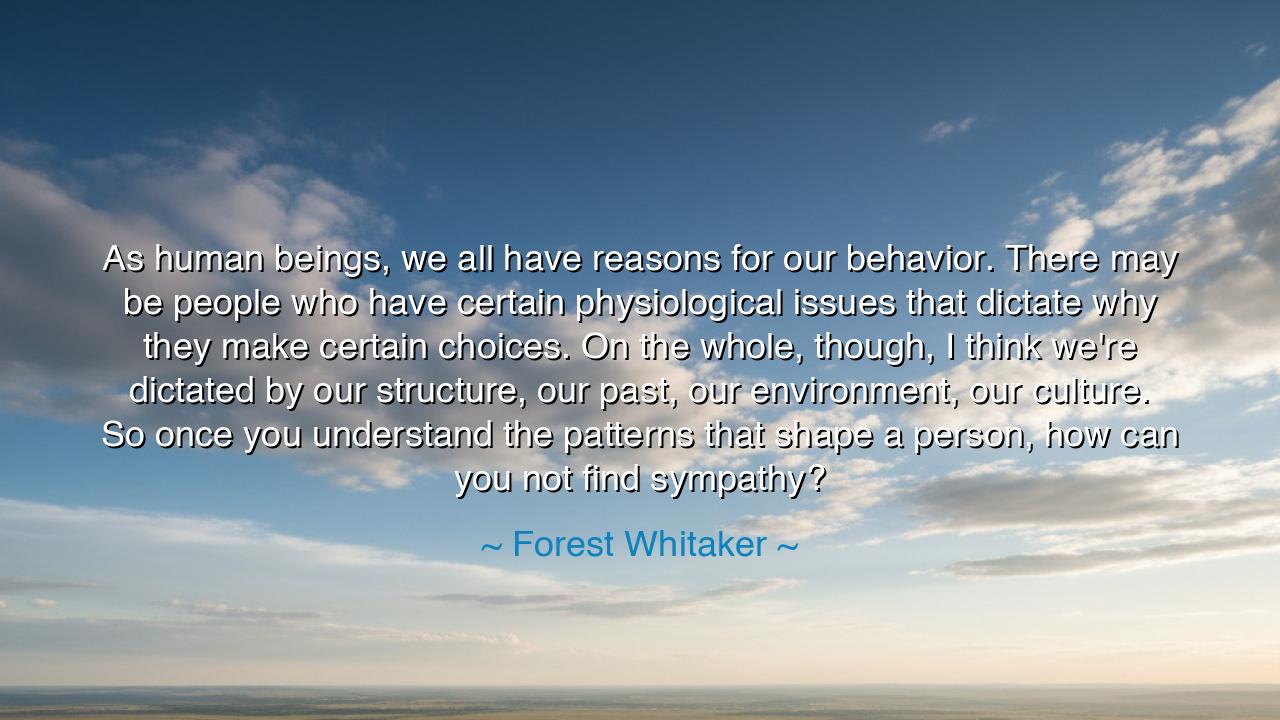
As human beings, we all have reasons for our behavior. There may
As human beings, we all have reasons for our behavior. There may be people who have certain physiological issues that dictate why they make certain choices. On the whole, though, I think we're dictated by our structure, our past, our environment, our culture. So once you understand the patterns that shape a person, how can you not find sympathy?






Hear, O seekers of understanding, the words of Forest Whitaker, who proclaimed: “As human beings, we all have reasons for our behavior. There may be people who have certain physiological issues that dictate why they make certain choices. On the whole, though, I think we’re dictated by our structure, our past, our environment, our culture. So once you understand the patterns that shape a person, how can you not find sympathy?” In this saying lies the timeless call to compassion: that to see the root of another’s actions is to feel the weight of their humanity, and to replace judgment with mercy.
The meaning is thus: every person is the sum of patterns—their structure, their past, their environment, their culture. Few choose their beginnings, and fewer still escape the marks those beginnings carve into their souls. Whitaker reminds us that behavior, even when destructive or misguided, often springs from causes deeper than the surface. To recognize this is to cultivate sympathy, not as indulgence, but as wisdom. For when you see the threads that weave another’s life, you cannot help but understand their choices.
The ancients themselves spoke of this truth. Consider the words of Socrates, who declared that no man knowingly does wrong, but acts in ignorance of what is good. His teaching was not to excuse evil, but to reveal that behavior is bound to knowledge, upbringing, and circumstance. To punish without understanding is blind; to judge without compassion is folly. Whitaker’s reflection is born of this same wellspring: that the wise must first seek to understand before they condemn.
History, too, bears witness in the life of Victor Hugo’s Jean Valjean—though a character of fiction, he embodies reality. Once a thief condemned for stealing bread, he was pursued by the merciless Javert, who saw only crime and not the hunger, the poverty, the desperation that shaped Valjean’s choice. Yet when given compassion, Valjean transformed into a man of virtue and mercy. The story illustrates Whitaker’s truth: to see the patterns that shape a person is to unlock the door to sympathy and, through sympathy, to redemption.
This teaching does not deny responsibility. To understand the roots of behavior is not to erase accountability, but to temper it with wisdom. A society that punishes without seeking causes will sow bitterness and reap division. But a society that looks into the soil—the trauma, the culture, the environment that shapes its people—will plant seeds of healing. Whitaker’s words are not a call to excuse, but a call to balance justice with understanding.
The lesson, then, is clear: seek always to see the roots, not just the fruit. When confronted with anger, ask what pain lies beneath. When you see cruelty, ask what wounds carved it. When you see failure, ask what walls of circumstance stood in the way. This habit of mind transforms enemies into neighbors, strangers into kin, and judgment into compassion. To live without such sympathy is to see the surface only; to live with it is to glimpse the soul.
What, then, should you do? In your daily life, pause before judgment. When wronged, ask yourself what forces might have shaped the one who harmed you. When teaching or leading, look for the patterns in those you guide—what pasts they carry, what cultures they embody. Practice sympathy not as weakness but as strength, for it is harder to understand than to condemn, and nobler to heal than to punish alone.
Thus let Forest Whitaker’s words echo: “Once you understand the patterns that shape a person, how can you not find sympathy?” For this is the ancient wisdom of compassion—that no human being is formed in isolation, that each is the child of past and place. To live by this truth is to rise above cruelty, to become not merely a judge of others, but a healer of hearts and a builder of peace.






AAdministratorAdministrator
Welcome, honored guests. Please leave a comment, we will respond soon